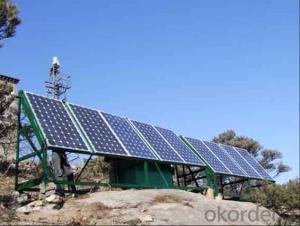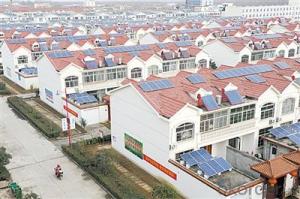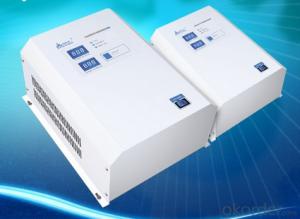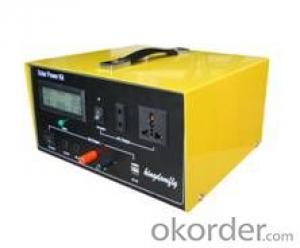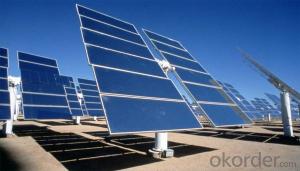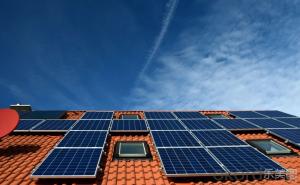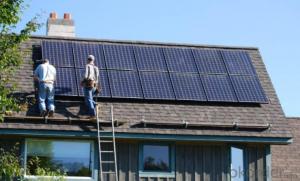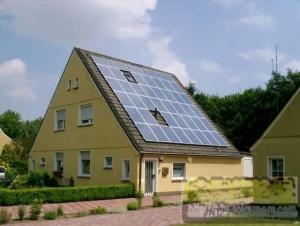Pratt Solar Energy Systems - Off-Grid Solar Power System 10KW High Efficiency
- Loading Port:
- China main port
- Payment Terms:
- TT OR LC
- Min Order Qty:
- 1 pc
- Supply Capability:
- 10000 pc/month
OKorder Service Pledge
OKorder Financial Service
You Might Also Like
1.Description of Product
Off-Grid Solar Power System is consisted of solar panel, solar charge controller, inverter, battery, mounting rack and cables.
(1).Grid-connected, send power to city grid
(2).MPPT technology, wide range of working voltage
(3).Simply Wiring, easy installation, customized design for your projects
(4).Low investment & long term feedback
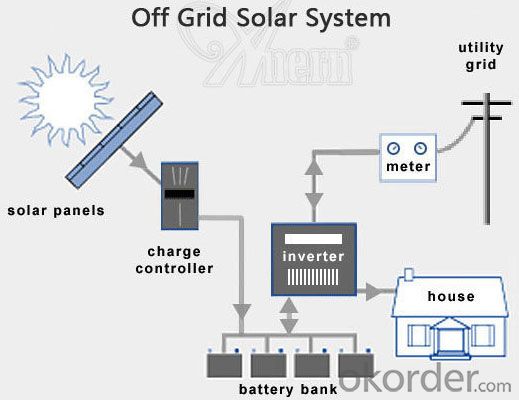
2. Off-Grid Features
1. Off grid solar power system is mainly used for application with relatively-small power consumption, and the areas have no grid network coverage, or grid power is unstable or outage condition.
2. It’s composed of solar panels, hybrid solar inverter, battery bank, solar panel mounting racks, and other accessories required fora complete home solar power system.
3. The battery bank gives a stable power output to the solar inverter which converts DC to AC to power loads, and provides power backup in rainy or cloudy days.
4. The solar panels generate electricity at daytime and charge the battery bank .
5. The off grid home solar power system provides grid power bypass in case of battery power shortage when sunshine is not enough.
6. All the off grid home solar power system configurations are worked out by scientific calculation and design.
The Product Parameter | |
Ref No. | 10KW |
Solar Panel | Type: Monocrystalline Silicon PV Module Max Power: 250W QTY:20 pcs |
Controller-Inverter Integrator | Rated Ouput Power: 7000W Rated DC Voltage: 96V QTY:1 pcs |
Battery | 12V/200AH per piece QTY:16 pcs |
Solar Panel Rack | Roof type mounting rack, anodized aluminum material, including complete fittings (Other type of racks can be customized as per client's requirement) QTY:1 pcs |
Cables | International standard, with specification suitable for solar system, BVV1*10 QTY:100m |
3.The Pictures of Product
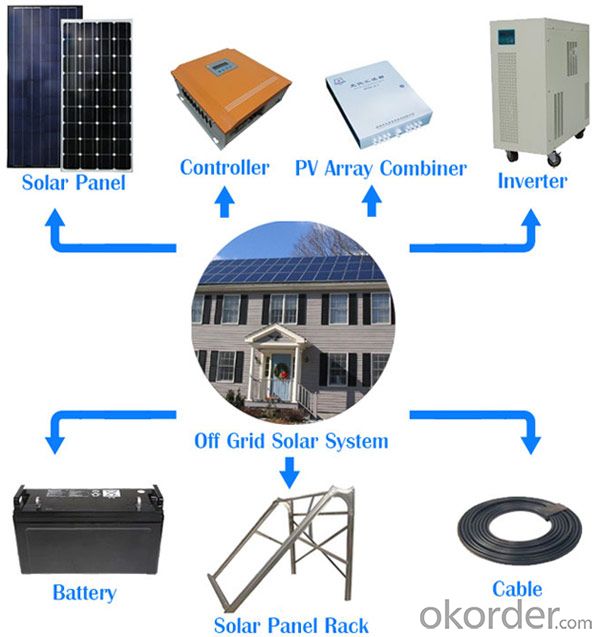
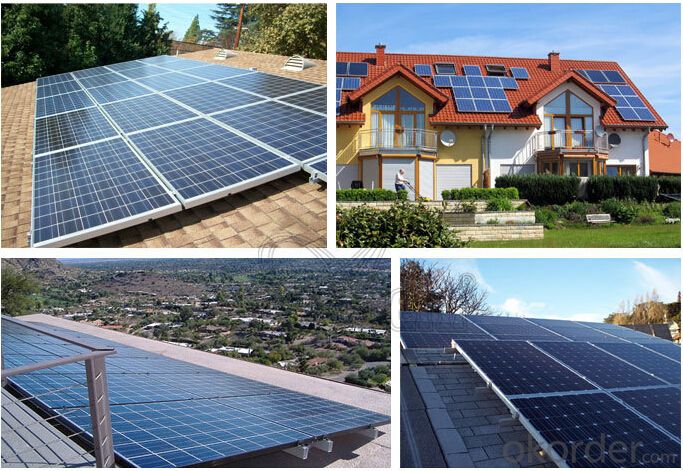
4.FAQ
Q1: What is the business type for the company?
A1: We are one of the biggest manufacturers inBejing.Chnia. Which is a high tech PV enterprise dedicated to the research, development, production and sales..
Q2: How long solar panel warranty can you offer?
A2: 10-Year product warranty,25-year linear power output warranty
If there is any quality problem, we will pay for freight and send free parts to you.
Q3: How many certificates do you have?
A3: We have 16 certificates,such as CE, TUV, UL, and so on.
Q4: Can I be the agent for you?
A4: Yes,We can discuss some information.
Q5: How to get a sample?How can cooperation with us
A5: contact us now.
- Q: Can solar energy systems be used in powering data centers?
- Yes, solar energy systems can be used to power data centers. Solar panels can be installed on the rooftops or in nearby areas to generate electricity from sunlight, which can then be used to power the data center's operations. This renewable energy source not only reduces reliance on fossil fuels but also helps in reducing carbon emissions, making it an environmentally friendly option for powering data centers.
- Q: How do solar energy systems impact the energy efficiency of a home?
- Solar energy systems have a significant impact on the energy efficiency of a home. By harnessing the power of the sun, these systems generate electricity that can be used to power various appliances and devices within the household. This reduces the dependence on traditional energy sources, such as fossil fuels, and helps in reducing greenhouse gas emissions. One of the key advantages of solar energy systems is that they provide a clean and renewable source of power. By utilizing the abundant sunlight, homeowners can generate their own electricity, thereby reducing their reliance on the grid. This not only helps in conserving natural resources but also lowers the overall carbon footprint of the household. Another way in which solar energy systems enhance energy efficiency is through the concept of net metering. Net metering allows homeowners to sell excess electricity generated by their solar panels back to the grid, thereby offsetting their energy consumption during times when the sun is not shining. This ensures that the energy produced by the solar panels is efficiently utilized and not wasted. Furthermore, solar energy systems often come with advanced monitoring and control features that allow homeowners to track their energy usage in real-time. This enables them to identify areas of high energy consumption and take necessary steps to optimize their energy usage. By making informed decisions based on this data, homeowners can further enhance the energy efficiency of their homes. In addition to reducing electricity bills, solar energy systems also increase the value of a home. Studies have shown that homes equipped with solar panels tend to sell at a higher price compared to those without. This is because potential buyers are attracted to the idea of reduced energy costs and an environmentally friendly lifestyle. Overall, solar energy systems play a crucial role in improving the energy efficiency of a home. By harnessing the power of the sun, homeowners can reduce their reliance on traditional energy sources, lower their carbon footprint, and save money on electricity bills. With continuous advancements in solar technology, these systems are becoming increasingly efficient and affordable, making them a viable option for homeowners looking to make their homes more energy-efficient.
- Q: Can solar energy be used for industrial processes?
- Yes, solar energy can be used for industrial processes. It is a versatile and sustainable source of power that can be harnessed for various industrial applications, such as heating, cooling, and electricity generation. By utilizing solar technologies like solar thermal systems and photovoltaic panels, industries can reduce their reliance on fossil fuels and lower their carbon footprint. Additionally, solar energy can provide a reliable and cost-effective solution for meeting the energy demands of industrial processes.
- Q: Can solar energy systems be integrated into building design?
- Building design can include the integration of solar energy systems. This approach is increasingly popular and is considered both sustainable and cost-effective for generating electricity. There are multiple ways to incorporate solar energy systems, such as using rooftop solar panels, solar facades, or solar windows. The most common method is installing rooftop solar panels. These can be standalone structures or integrated into the roof itself. They capture sunlight and convert it into electricity, which can power the building or be fed back into the grid. Solar facades are another option. These involve placing solar panels on the outer walls of buildings. Besides generating electricity, they also act as a protective layer, reducing heat gain and improving energy efficiency. Solar windows are a new development in building design. These windows have built-in transparent solar cells that capture sunlight and generate electricity while still allowing natural light to enter the building. They have the potential to revolutionize building design by seamlessly integrating renewable energy generation into the building envelope. Integrating solar energy systems into building design offers several advantages. Firstly, buildings can generate their own electricity, reducing reliance on fossil fuels and lowering utility bills. This also contributes to reducing greenhouse gas emissions and creating a cleaner environment. Additionally, solar energy systems can enhance the aesthetic appeal of buildings, making them visually striking examples of sustainable architecture. In conclusion, solar energy systems can be integrated into building design. With options like rooftop solar panels, solar facades, and solar windows, buildings can generate clean, renewable electricity, reduce their carbon footprint, and contribute to a more sustainable future.
- Q: Are solar energy systems suitable for agricultural applications?
- Yes, solar energy systems are highly suitable for agricultural applications. They provide a clean and renewable source of power that can be used to meet the energy needs of various agricultural activities such as irrigation, crop drying, and powering electric fences. Solar energy systems are cost-effective, environmentally friendly, and can be easily installed in rural areas, making them an ideal choice for farmers and agricultural businesses.
- Q: Can a solar energy system be used to power agricultural operations?
- Yes, a solar energy system can be used to power agricultural operations. Solar energy systems, such as solar panels, can generate electricity by converting sunlight into usable energy. This electricity can be utilized to power various agricultural operations, such as irrigation systems, water pumps, machinery, and lighting. Solar-powered irrigation systems are particularly beneficial for agricultural operations as they can provide a reliable and sustainable source of energy for watering crops. These systems can be designed to automatically turn on and off based on sunlight availability, ensuring that crops receive the necessary amount of water. Solar-powered water pumps can also be used to extract water from wells or other water sources, reducing the reliance on fossil fuels and minimizing operational costs. Additionally, solar energy can be used to power machinery and equipment used in agricultural operations. This includes tractors, harvesters, and other farm equipment, reducing the dependency on fossil fuels and lowering carbon emissions. Solar-powered lighting can also be installed in agricultural facilities, such as barns or storage areas, providing illumination without the need for grid electricity. In regions with abundant sunlight, solar energy systems can be a cost-effective and sustainable solution for powering agricultural operations. They offer numerous benefits, including reduced operational costs, decreased carbon footprint, and increased energy independence.
- Q: How can solar energy systems reduce electricity bills?
- Solar energy systems can reduce electricity bills by generating electricity from sunlight, which can be used to power homes and businesses. By using solar power, individuals can rely less on traditional electricity sources, resulting in lower energy consumption from the grid. This leads to decreased reliance on utility companies and ultimately reduces electricity bills. Additionally, excess solar energy can be sold back to the grid, further offsetting electricity costs.
- Q: Can solar panels be installed on different surfaces like glass or metal?
- Yes, solar panels can be installed on different surfaces like glass or metal. In fact, solar panels are commonly installed on glass surfaces, such as windows or skylights, to maximize sunlight exposure. Additionally, solar panels can also be mounted on metal roofs or other metal structures. The key requirement is ensuring a sturdy and secure installation to support the weight of the panels and maximize their efficiency.
- Q: Can a solar energy system be installed on a ground-mounted structure?
- A ground-mounted structure is capable of accommodating a solar energy system. Ground-mounted solar systems are highly sought after for residential, commercial, and utility-scale installations. These systems involve the installation of solar panels on a structure built on the ground, such as a pole, rack, or frame. Ground-mounted systems offer numerous advantages, including the flexibility to place panels in various locations, simpler maintenance and cleaning, and the ability to optimize panel angle and orientation for maximum energy production. Additionally, ground-mounted systems can be implemented in situations where rooftop installation is not possible, such as properties with limited roof space or shading issues. Consequently, the installation of a solar energy system on a ground-mounted structure presents an effective and efficient means of harnessing solar power.
- Q: How do solar energy systems impact the overall sustainability of a home?
- A home's overall sustainability is significantly affected by solar energy systems. To begin with, these systems greatly reduce reliance on finite fossil fuels, which contribute to climate change. By harnessing the sun's power, solar energy systems generate clean, renewable electricity that is free from harmful emissions and pollutants. This not only helps combat climate change but also enhances air quality in the surrounding environment. Additionally, solar energy systems grant homeowners energy independence and resilience. By generating their own electricity, homeowners can reduce their dependence on the grid and avoid fluctuations in energy prices. This leads to long-term cost savings and improved financial stability. Moreover, during power outages or natural disasters, solar energy systems equipped with battery storage offer a reliable source of electricity, ensuring vital appliances and systems continue to function. Furthermore, solar energy systems enhance a home's energy efficiency. By supplementing or replacing traditional energy sources, these systems decrease overall energy consumption in a household, resulting in reduced utility bills and resource conservation. Moreover, the installation of solar panels can boost a home's value. As renewable energy becomes increasingly popular and desirable, potential homebuyers are more willing to pay a premium for properties equipped with solar energy systems. This benefits not only homeowners looking to sell their homes but also contributes to the overall growth and adoption of sustainable energy solutions. Lastly, solar energy systems foster a sense of environmental stewardship and sustainability. By utilizing renewable energy, homeowners actively contribute to reducing their carbon footprint and preserving the planet for future generations. This commitment to sustainability extends beyond the household, inspiring others to embrace clean energy and work towards a greener future. In conclusion, solar energy systems have a wide-ranging and positive impact on a home's overall sustainability. They diminish reliance on fossil fuels, enhance energy efficiency, provide energy independence and resilience, increase property value, and promote environmental stewardship. By harnessing the sun's power, solar energy systems pave the way for a more sustainable and resilient future.
Send your message to us
Pratt Solar Energy Systems - Off-Grid Solar Power System 10KW High Efficiency
- Loading Port:
- China main port
- Payment Terms:
- TT OR LC
- Min Order Qty:
- 1 pc
- Supply Capability:
- 10000 pc/month
OKorder Service Pledge
OKorder Financial Service
Similar products
Hot products
Hot Searches
Related keywords
